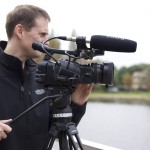Video and audio interview tips from journalist and broadcaster Stephen Pritchard
 By Ana
By Ana
 I recently spoke to journalist and broadcaster Stephen Pritchard. Having worked in the industry for over 20 years for media including the Financial Times and Guardian, he is well placed to give some very interesting views and tips on how to take part in interviews.
I recently spoke to journalist and broadcaster Stephen Pritchard. Having worked in the industry for over 20 years for media including the Financial Times and Guardian, he is well placed to give some very interesting views and tips on how to take part in interviews.
Stephen works as a reporter and also as a video journalist filming and editing his own material; he also regularly hosts programmes and chairs live webcasts and events, and has carried out media training for senior executives in business, government and the not-for-profit sector.
Stephen was kind enough to share his top tips for taking part in effective live video and audio interviews below:
Appearing live on radio or TV is a daunting experience, even for the most experienced media commentator. But there are steps you can take to make it easier – and to make sure that the interview helps put your message across.
Give yourself plenty of time
One thing that's bound to make you – and the producer – nervous is being late. Be on time to any studio interview, and do ask the producers when they'd like you to arrive.
Bear in mind, though, that studios don't always have a lot of space for guests to wait, so try not to be too early. On that point, resist bringing an entourage: busy news and production teams have enough to do, without entertaining guests' assistants and PRs.
Let the producer guide you
What type of contribution does the programme want from you? You may already have spoken to the journalist or a researcher, and they should have explained the interview or programme format. It really helps to know whether you're being asked for a quick sound bite, a more in-depth view, or to contribute to a debate.
The producer will also tell you if you're going to be speaking to the camera, to a reporter off screen, or an onscreen presenter. But if in doubt, ask.
Listen to the questions
Some of the most frustrating interviews – for a producer and for a viewer – are where the interviewee launches into a monologue, regardless of the questions they're being asked.
Of course, it's important to put your message across, but slavishly repeating pre-prepared points is at best, dull and at worst, appears arrogant or evasive. Tailoring your answers to the questions is the best way to appear an authority on the topic. The producer will tell you if the questions will be left in the interview – or edited out, in which case try to answer in complete sentences.
Speak clearly, slow down and avoid jargon
On TV (and radio) you only have a few minutes to make your point. For the most part, you're talking to a general, rather than specialist audience, and perhaps an international one too. Speaking clearly is important.
It's best to speak more slowly than usual -- professionals are very good at slowing down their delivery – and to avoid any industry jargon or "business speak".
At the same time, be yourself. Easier said than done in a studio of course, but the best interviewees are those who come across as at ease, and let their personality come through. No-one wants to watch a corporate clone on screen. By all means put across your organisation's message, if it's relevant and appropriate, but in your words and in your way.
Have something to say
Have something to say, and a clear idea of how you want to say it.
Having a point of view makes the interview convincing. It's always easier to give an interview on a subject you know well, and care about. If you're not really the expert, it can be better to say no to the interview, and suggest someone who might do it better.
A rough plan will help you make your points concisely. It's not a good idea to try to write a script – let alone have someone else write one for you – but an hour's brainstorming with trusted colleagues will help to draw out the points that should make an interesting interview, and the best order to present them.
Remember, you are the expert
TV and radio can be daunting, but there is a reason a programme maker has booked you: your know-how. All the paraphernalia of broadcasting is just a means to an end.
What the producer wants is a natural, articulate, enthusiastic and knowledgeable guest.
What the viewer or listener wants is an informative programme. The interviewer, and the viewer, are unlikely to be experts in your field; that's why you're there.